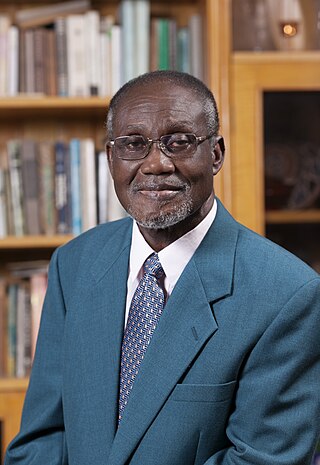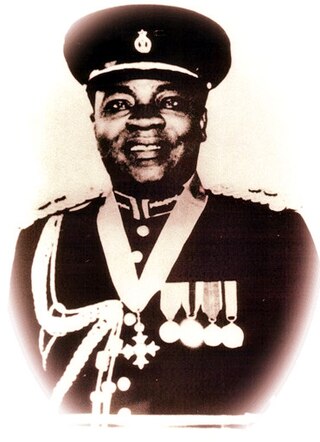Related Research Articles

Joseph Kwame Kyeretwie Boakye Danquah was a Ghanaian politician, scholar, lawyer and statesman. He was a politician in pre- and post-colonial Ghana, which was formerly the Gold Coast, and is credited with giving Ghana its current name.

Obed Yao Asamoah is a Ghanaian lawyer, academic and politician. Asamoah was the longest serving foreign minister and Attorney General of Ghana under Jerry Rawlings from 1981 to 1997. Asamoah was educated at King's College London and at Columbia University.

William Ofori Atta, popularly called "Paa Willie", was a founding member of the United Gold Coast Convention (UGCC) and one of the founding fathers of Ghana as one of "The Big Six" detained by the British colonial government in the then Gold Coast. He later became a Minister for Foreign Affairs in Ghana's second republic between 1971 and 1972.

Erasmus Ransford Tawiah Madjitey, was a Ghanaian police officer, diplomat and politician. He was appointed Police Commissioner in the Dominion of Ghana on 9 October 1958, making him not only the first Ghanaian to head the Ghana Police Service, but also the first African south of the Sahara and in the British Commonwealth to command a police force.
Victor Owusu was a Ghanaian politician and lawyer. He served as Attorney General and Minister for Justice on two occasions which were under the NLC and then Busia regime and also became Minister for Foreign Affairs under the Busia regime. He was the Popular Front Party's presidential candidate for the 1979 Ghanaian general election.

The Democratic Freedom Party (DFP) was a political party in Ghana. It was formed in 2006 and eventually merged with the National Democratic Congress in 2011. It came in fourth place in the Ghanaian general election of 2008 with 0.33% of the total vote.

Nana Sir Ofori Atta I, KBE was the Okyenhene or King of the Akyem people and of Akyem Abuakwa, a traditional kingdom that stretches back to the thirteenth century and was one of the most influential kingdoms of the then Gold Coast Colony. He ruled from his election in 1912 until his death in 1943.

Henry Romulus Sawyerr, was a Ghanaian politician and surveyor. He was Minister for Education from 1993 to 1997 in Jerry Rawlings' first presidential term of office, under the Fourth Republic. In the Second Republic, Sawyerr was Member of Parliament (MP) for Osu-Klottey as a non-party candidate. In the Third Republic, he was again elected MP but gave up the seat to be in Hilla Limann's cabinet as Minister for Transport and Communications from 1979 to 1981.
The Ofori-Atta family is composed of the bearers of an Akan language patronymic surname and their relatives. The family is of royal Akyem origins and has been active in business, politics, law and government in Ghana.
Adeline Sylvia Eugenia Ama Yeboakua Akufo-Addo was a First Lady in the second republic of Ghana as the wife of Edward Akufo-Addo and mother of Ghanaian president Nana Akufo-Addo.
Nana Kwame Akuoko Sarpong, is a traditional ruler, a politician and a lawyer. He is the paramount chief or Omanhene of the Agogo Traditional Area of Ghana. He served as Secretary for Health, Secretary for Internal Affairs and Secretary for Chieftaincy Affairs in the PNDC government. He also served as a member of the council of state in the fourth Republic.
Kwaku Baah is a Ghanaian lawyer and a politician. He was a deputy minister in the second republic, the minority leader in the third republic and vice chairman of the National Democratic Congress in the fourth republic. He also served as a member of parliament for Nkawkaw Constituency in the second and third Republic of Ghana.
Akwasi Andrews Jones Amoako Atta Ofori Atta was a Ghanaian economist and politician. He was a senior lecturer in economics at the University of Ghana and served as ministerial secretary for Finance and Economic Planning in the Busia government.
Thomas Kwame Aboagye was a Ghanaian lawyer and politician. He was a deputy minister for defence during the second republic, and the member of parliament for the Subin Constituency during the second republic and third republic.
Henry Satorius Bannerman was a Ghanaian medical practitioner and a politician. He once served as president of the Ghana Medical Association, president of the Commonwealth Medical Association and a member of the executive council of the University of Ghana Medical School. As a politician, he was the national chairman of the United Nationalist Party and served as a member of parliament for the Ashiedu Keteke constituency during the second republic. He together with Alex Hutton-Mills were the only UNP candidates elected into parliament in the 1969 parliamentary election.
References
- ↑ "State burial for Victor Owusu". ghanaweb.com. Ghana Web. 9 February 2001. Retrieved 17 March 2020.
- ↑ Asamoah, Obed (2014). "1. Growing Up". The Political History of Ghana (1950-2013). The Experience of a Non-Conformist (eBook ed.). Bloomington, USA: AuthorHouse. ISBN 978-1-4969-8563-7.
Admittedly, this is also founded on the fact that I was the General-Secretary of the United National Convention (UNC), led by a veteran Danquah-Busia politician, Mr. William Ofori-Atta (Paa Willie), and subsequently the General Secretary of the All People's Party (APP), formed by the merger of the UNC with the Popular Front Party (PFP) in 1981, under the leadership of Mr. Victor Owusu, another Danquah-Busia stalwart.
- ↑ "Leadership of minority parties is no problem". Ghana News. 10 (9): 2. September 1981. Retrieved 17 March 2020.
- ↑ "Victor leads new party". Ghana News. 10 (10): 2. October 1981. Retrieved 17 March 2020.
- ↑ "Action Party gives reasons for withdrawing from merger". Ghana News. Washington DC: Embassy of Ghana. 10 (10): 4. October 1981. Retrieved 17 March 2020.